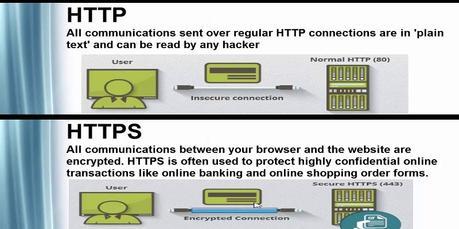Google is the king of search engines! I know you agree with it.. Considering the ranking factors and security concerns for the online businesses back in august last year Google officially announced about switching your website over to HTTPS feature that will monitor and give your website a push in boosting rankings.
The crux of the Google blog post was stating the probable reasons behind this huge announcement which is in owe to the security of online businesses and that they have begun to "witness more and more webmasters adopting HTTPS." Nevertheless, the blog post does also affirm that HTTPS will be just a "small fry signal" that will be affecting less than 1% of the global queries.

According to research on Alexa top sites, there has been 44.98% change in HTTPS websites from August 2016 to February 2017. Even world's most popular news websites have now moved to HTTPS protocol.

Okay so if Google says so, Let's Do it!! This article will let you know some insights and a clear understanding on How HTTP and HTTPS effects SEO rankings and why it is imperative to get HTTPS for effective SEO.
So What is: HTTP vs HTTPS!
Image credits: Youtube
How To Launch A Self-Hosted WordPress Blog: In 10 Minutes Or Less So are they both different? If yes, what is the difference between HTTP vs HTTPS?HTTP is Hypertext Transfer Protocol; it is a dedicated structure for relocating and getting information on the web. It is commonly operated to recover HTML web pages and is considered an application layer protocol. Its basic aim is to transmit the present information to the web user no matter whichever channel it takes to do so.
HTTP is naïve, which means it utilizes the data by disregarding earlier web sessions. Whereas, HTTPS, (stands for Secure HyperText Transfer Protocol), was recognized to authorize secured transactions and strong consent over the web. This is because swapping information, like mobile number, credit card numbers or e-mail access needs high-level security to prevent unauthorized entry via HTTPS.
HTTPS is HTTP only but it is just a secure version for better encryption of information. HTTPS pursue the same protocols as HTTP does; here the browser starts a connection to the dedicated server on a standard port. The only difference it the additional layer of HTTPS that is "S" for security that uses SSL to transmit data. HTTPS use TCP Port 443 by default; hence they both use two separate modes of communications.
Here SSL comes in the picture! Let's see the role of SSL!
People often get confused with the HTTPS and SSL and use them interchangeably, but that isn't correct. HTTPS is a secure feature because it uses SSL to transmit data. Here both share different technicalities that are a bit complicated, though. Basically, HTTPS works concurrently with another protocol that is SSL certificate (Secure Sockets Layer) to transfer the data and to gain uninterrupted communication. This is done in three ways, let's see below -
- Encryption of data: Encrypting the transferred information and data for enhanced security.
- Data Integrity is must: Data cannot be distorted or besmirched during the transmission phase.
- Authentication is the key: Users are properly authenticated to correspond and communicate with the website in the right manner.
More importantly EV SSL certificate is authenticated for the data transmission and information exchange as the EV SSL certificate offers extended security with green padlock in the address bar of the URL. This takes us to further understanding and benefits of implementing HTTPS as a ranking factor in terms of SEO advantages.
Switch to HTTPS for better SEO rankings!
Now as we have learned about the importance of HTTPS and SSL certificate to be installed on a website it is time to follow Google's recommendations to change to HTTPS because it is an easy, more secure and smart decision to take, especially for those who are into e-commerce integration. This step will certainly benefit the security of your website and will put your customers on secure mode to make easy-flowing transactions anywhere. Additionally, there are some additional SEO benefits as well to consider:
Improved Rankings - This is the first and the foremost advantage of getting HTTPS to your website as when converting to HTTPS you may get a good increase in your ranking and most of the SEO experts advise it as an integral part of an overall SEO strategy and planning. Also, with time the way Google's search algorithms have developed their statements regarding a thrust for a more secure web, it is quite probable that we may see an augmented impact of HTTPS on search rankings over the time.
Referral Data - In case you are exploring and analyzing Google Analytics for your HTTP website, then the traffic passing-by via referral sources can show as "direct" traffic. On the other hand through HTTPS feature, the security of the referring domain is sealed and secured. Hence, getting HTTPS is a wise decision to make.
Privacy and Security - Needless to explain anymore that HTTPS adds augmented security for your SEO goals and website in numerous ways, have a look -
- It authenticates that the website is that one server to which it is supposed to be talking to.
- It makes your website more secure for your users and visitors.
- It encrypts all the communication, including URLs, that safeguards stuffs like browsing history and credit card numbers.
- It averts meddling by the third parties.
Let's move further to know if there are any concerns in switching to HTTPS!
You shall not really worry about switching from HTTP to HTTPS in terms of SEO, as Google has been telling the webmasters that it is very secure to do. However, one must go through some notions to make certain your traffic doesn't suffer.
- You should check that the site redirected to HTTPS is crawled by Google. PS. Make sure that robot.txt file is blocking HTTPS. When you redirect from HTTP to HTTPS, Google will count it "site move" and your website traffic will be affected.
- Follow Google's tips and best practices while switching to HTTPS
- Settle on kind of SSL certificate you need: single, multi-domain, or wildcard certificate
- Use 2048-bit key certificates and relative URLs for resources
- Make sure to use protocol relative URLs for all other domains
- Don't block your HTTPS website from crawling and using robots.txt
- Use Google's updated Webmaster Tools to better handling of HTTPS sites
- Make sure to track your HTTP to HTTPS migration very cautiously in your analytics software
- Allow indexing of all pages by search engines wherever possible
- Shun the no index robots meta tag
- Additionally, it's recommend having a good read on a condensed introduction to HTTP/HTTPS and also some advice and tips on switching over to SSL/HTTPS
So what's your takeaway?
I hope that the article justifies the point of switching to HTTPS with installing SSL certificate to gain better SEO rankings for your website. If we look over SSL certificate types, it is myth that a single type of SSL is enough for all websites.
You can select from different types of SSL like domain level certificate, business validation certificate, Code signing certificate, EV SSL certificate. Overall, when we look at the future holistically consider what Google is likely to do with HTTPS, therefore, we recommend switching over to HTTPS, ASAP, to keep pace with Google.



